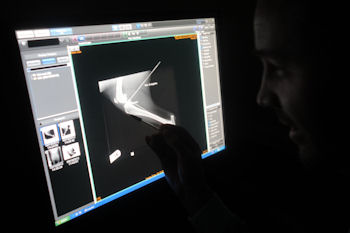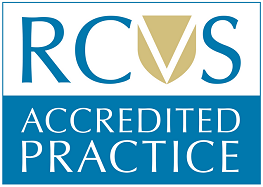All branches of St James Veterinary Group are modern and well equipped and we are able to offer a wide range of services and facilities.
Our main flagship Parkway Surgery opened in Sketty in June 2010 and has received RCVS Tier 3 Accreditation (Small Animal Hospital Status). Parkway has separate dog and cat waiting areas, 4 consult rooms, a separate cattery and dog kennels, comprehensive diagnostic equipment (including endoscopy / ultrasonography / digital radiography) and 3 operating suites - including one dedicated to orthopaedics. Parkway also has separate dog and cat isolation areas, a dog walking area and plenty of car parking spaces.
Facilities and services
Our Pet Health Club open only to our registered clients, is a great way to cut the cost of veterinary care for your pet. The Pet Health Club differs from pet insurance in that it covers things that pet insurance generally does not cover such as vaccination, worming and parasite control.
We believe that a proactive approach to your pet's health is better than waiting until they become ill to put things right. A preventative approach also gives you the peace of mind that your pet is getting the best possible health care helping them to lead a happier, healthier life.*
Join today and start saving up to 30%
You can make great savings on the annual costs of what we call 'preventative maintenance' - all the things that are essential to keep your pet in tip-top condition.
Additionally, we will reward your loyalty with exclusive Pet Health Club discounts on, amongst other things:
- routine neutering
- dentals
- pet foods/ diets
- microchipping
- rabies vaccines
We can't emphasise enough how important it is to provide routine veterinary care and joining the Pet Health Club will help you do so for an affordable fixed monthly cost. Read our PDF Pet Health Club leaflet for more details.
It's so easy to join
If you are registered as a client with one of our branches, simply follow the link to sign up online or download a PDF application form and pop in to one of our branches and ask at reception about joining our Pet Health Club. There's no joining fee and the simple and affordable monthly payments get collected by direct debit.
PHC downloads
PHC Pricing
* Please be advised it is the client's responsibility to ensure that they pick up the worming and flea treatments paid for in either Option 1 or Option 2.
Weight clinics are run by some members of our qualified Veterinary Nurse team.
This weight clinic provides friendly advice to owners concerned about their pet’s weight. Please contact our Penllergaer branch for further information on 01792 895154 or to speak to Ms Alex John RVN.
St James Vet Group works very closely with the RSPCA, Llys Nini and other local animal based charities.
Over the years the practice has been proactive in assisting with the treatment, rehabilitation and re-homing of thousands of cats and a large number of dogs. The practice ethos has always been to never put a healthy animal to sleep.
Any stray animal that is presented to us is checked for a microchip or other form
of identification and is given any emergency treatment it requires.
Notification together with pictures of the stray animal is posted on our social media to help reunite the pet with it's owner.
If no owner comes forward, and once we're happy they are well enough, animals are then
transferred to one of our local rehoming centres to be found a new home.
Could your pet be a life saver?
From time to time both dogs and cats that we treat at the surgery require blood transfusions. Sometimes this is due to blood loss, e.g. if the animal has been involved in a road traffic accident, if the animal has lost a lot of blood during an operation, or if the animal’s own immune system is involved in destroying its own blood cells.
This is Tyson, a sturdy English Bull Terrier who has donated blood in the past to help save the lives of some of our hospitalised patients.
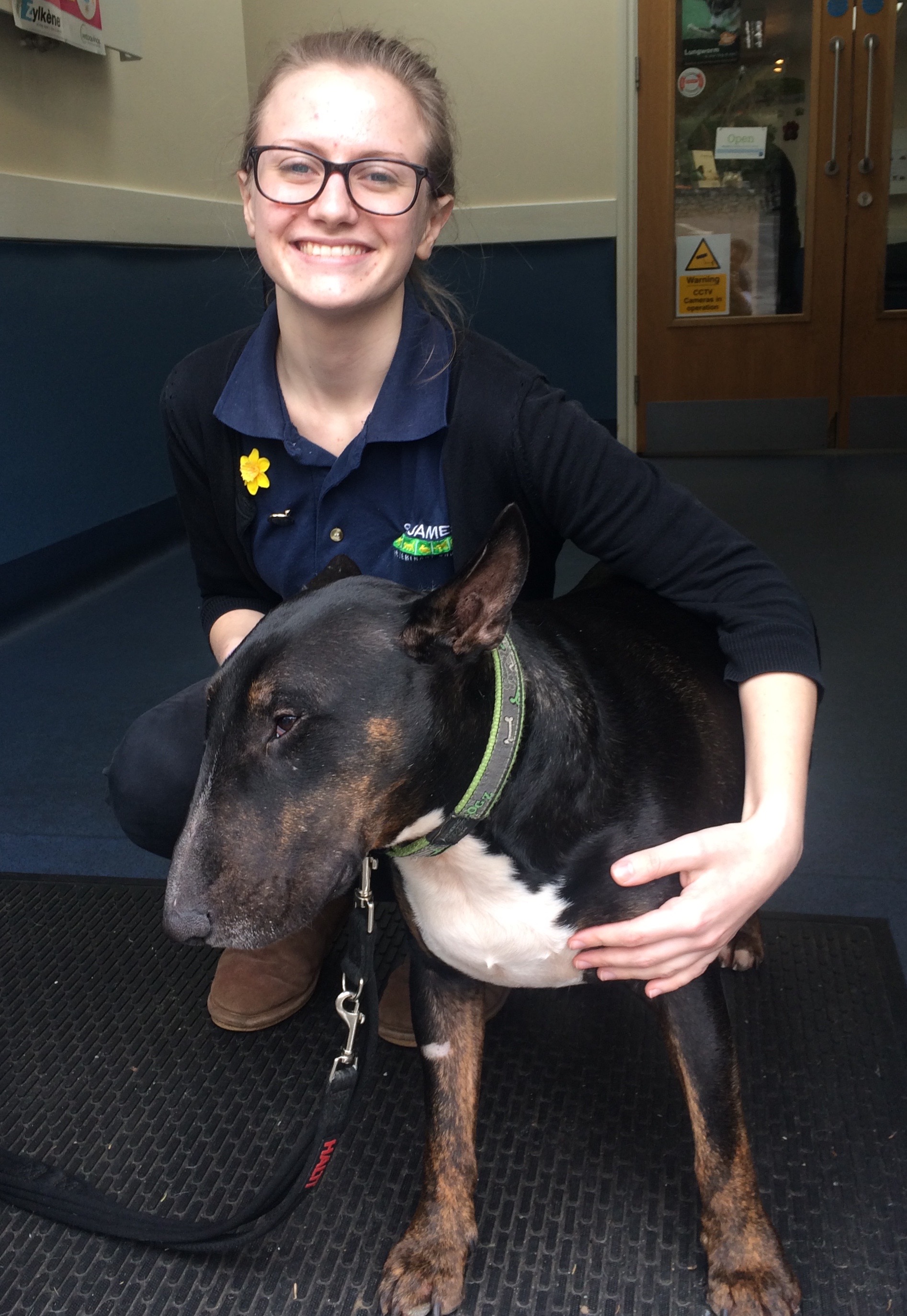
If you would be prepared to register your animal as a potential blood donor so that we could contact you in an emergency, then please send us an email
Please include the following details:
- Your pet's name
- Your surname
- Your address
- Your daytime telephone/ mobile number
- The approximate weight of your pet
Normally we would ask that potential canine donors be over 30kg in weight and feline donors be at least 4kg.
We will provide a free blood test to assess your pet’s suitability before donation and also type your pet’s blood prior to transfusion.
Thank you on behalf of the St James team.
If you would like pricing information for any of the services or products that we offer then please contact your nearest branch surgery where the receptionist will be happy to assist you.
Vaccinations
All our puppy and kitten vaccination course prices include a free health check, a free dose of worming and flea treatment and 4 weeks free insurance.
There is also the option to get your pet micro-chipped at the same time at a discounted rate if aren't already microchipped.
Neutering
All prices include pain relief, post operative check up if necessary, and stitch removal 10 days after surgery.
Credit and insurance
As a general rule we do not offer credit and expect payment at the time of treatment.
At St James our team are committed to ensuring that you and your pet receive the best treatment and service possible at all times. Repeated trips to any vet however, can mean that costs can quickly add up.
As a practice we cannot emphasise enough the value of pet insurance.
Insuring your pet with a reputable insurance company gives you the confidence and reassurance that you can make decisions about the health care and treatment of your pet without financial constraints.
You can then relax in the knowledge that your pet is receiving the best possible treatment and that you have one less thing to worry about during what can be a stressful time.
My pet is drinking a lot of water...
1. Try and quantify how much water your pet is drinking by measuring the amount of water you put in their water bowl over a twenty four hour or three day period. (An animal is drinking excessively if it is drinking 100ml/kg/day which for the average cat is about ¾ of a pint).
2. Note whether your pet's appetite has increased or decreased.
3. Note whether your pet’s weight has changed over the last few weeks.
4.Try to collect a urine sample and bring this into the surgery to give to the vet for analysis with your first consultation.
My pet is itchy...
1. Identify when your animal was last treated for fleas.
2. Decide whether your pet is itchy in any one particular area e.g. near its tail base/ all over.
3. Is your pet biting at its feet?
4. Have you changed your pet's food or changed anything in the home environment recently?
5. Make an appointment to see a vet to discuss the above information.
My pet has developed a cough...
1. When did you first notice the cough?
2. What is the nature of the cough? Is it dry or productive (i.e. does the animal cough material up then swallow shortly after?)
3. Does your pet have a penchant for eating slugs/snails/grass and has it been wormed recently (see lungworm)? If this is the case try bringing in a faeces sample with your first appointment to see one of our vets.
4. Have you noticed your animal slowing down recently (e.g. on a walk)?
5. Make an appointment to see a vet to discuss the above information.
Coughing can be due to a primary lung problem e.g. bronchitis/ pneumonia/ worms or secondary to an underlying heart problem. Cats rarely cough unless they are asthmatic or suffering from severe lung disease.
My pet is becoming stiff/ slowing down/ sleeping more (cats)...
1. When did you first notice the problem?
2. Is your dog stiff in the morning or after a walk?
3. Has your dog become lame?
4. Is your dog reluctant to jump on the sofa/back of the car?
5. Has your cat’s coat become unkempt?
6. Is your cat reluctant to jump and spends more time than normal sleeping?
We are proud to still be one of the only vets in Swansea that provide our very own 24 hour emergency service. This is on our own premises and run by our very own vets and nurses. We do not out source our OOH service to any other veterinary companies. The 24 hour service is run from our main flagship Parkway surgery in Sketty, and has Tier 3 Small Animal Veterinary Hospital status so you can rest assured that your pet is in the best possible hands.
Who should I call if I feel my animal needs to be seen out of hours?
If you ring your usual branch surgery, you will be directed through to the ‘out of hours service’. The out of hours number is 01792 200900. Please be ready with your pet’s name, your surname, your address and the branch that you usually attend. Usually one of the nurses will answer your call, and if required will get the vet to return your call, or ask you to come along to the Parkway surgery.
How much will it cost to be seen out of hours?
To have a practice which is kept open 24 hours a day, 7 days a week with nurses always on site is fairly expensive to run, however we try to keep our out of hours costs to a minimum, and will always inform you of the associated costs before you decide whether to come in and be seen.
My pet is insured, will I have to pay to come in out of hours?
If you have insurance for your pet which covers out of hours treatment at the vets, we will be more than happy to assist with making a claim. Please be aware that you will have to pay your excess up front and drop off a claim form at the earliest possible convenience to ensure the claim can be processed.
Can I phone for advice out of hours?
If you are concerned about your animal, or feel that your animal may benefit from being seen out of hours, please ring before you decide to come in. The nurse may be able to offer assistance over the phone, or reassure you that you can wait until the morning to be seen by a vet, on the other hand, they may ask you to come straight down to the surgery.
Please do not ring the out of hours number for general information as you may be taking away the phone line from a genuine emergency call.
Will my animal be left on their own during the night if they are staying in?
No, your animal will not be left on their own, there are always at least 2 nurses on the premises who will give your animal the around the clock care and attention that they require. Obviously they will be given chance to get some rest and some sleep, however if they require medication or treatment throughout the night, this will be dealt with as necessary.
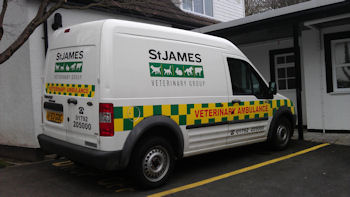 At St James Veterinary Group we are lucky enough to have a practice ambulance. This is used to transport sick pets safely between branches and our main Parkway branch in Sketty. It is also used to collect animals and for home visits.
At St James Veterinary Group we are lucky enough to have a practice ambulance. This is used to transport sick pets safely between branches and our main Parkway branch in Sketty. It is also used to collect animals and for home visits.
If you are unable to transport your animal to the surgery and feel that you require the service of the practice ambulance, please telephone the Parkway Surgery to discuss this with the reception team. Please note that we are unable to transport an owner to the surgery with the animal, you will have to arrange your own transport to and from the surgery.
At St James Veterinary Group we can offer a range of chemotherapy protocols, including those involving doxorubicin, and carboplatin to treat animals affected by cancers such as lymphoma, leukaemia or osteosarcoma,
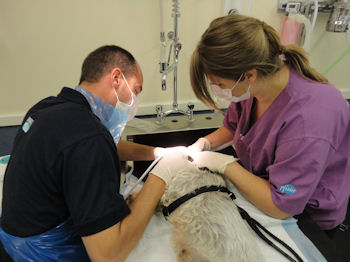 All surgeries offer ultrasonic scaling and polishing to improve your pets dental health. Dental Grading System
All surgeries offer ultrasonic scaling and polishing to improve your pets dental health. Dental Grading System
We also have dental X Ray facilities at our Parkway, Whitegates, Walter Road and Penllergaer branches to improve the amount of diagnostic information we can obtain before treating your pet's teeth.
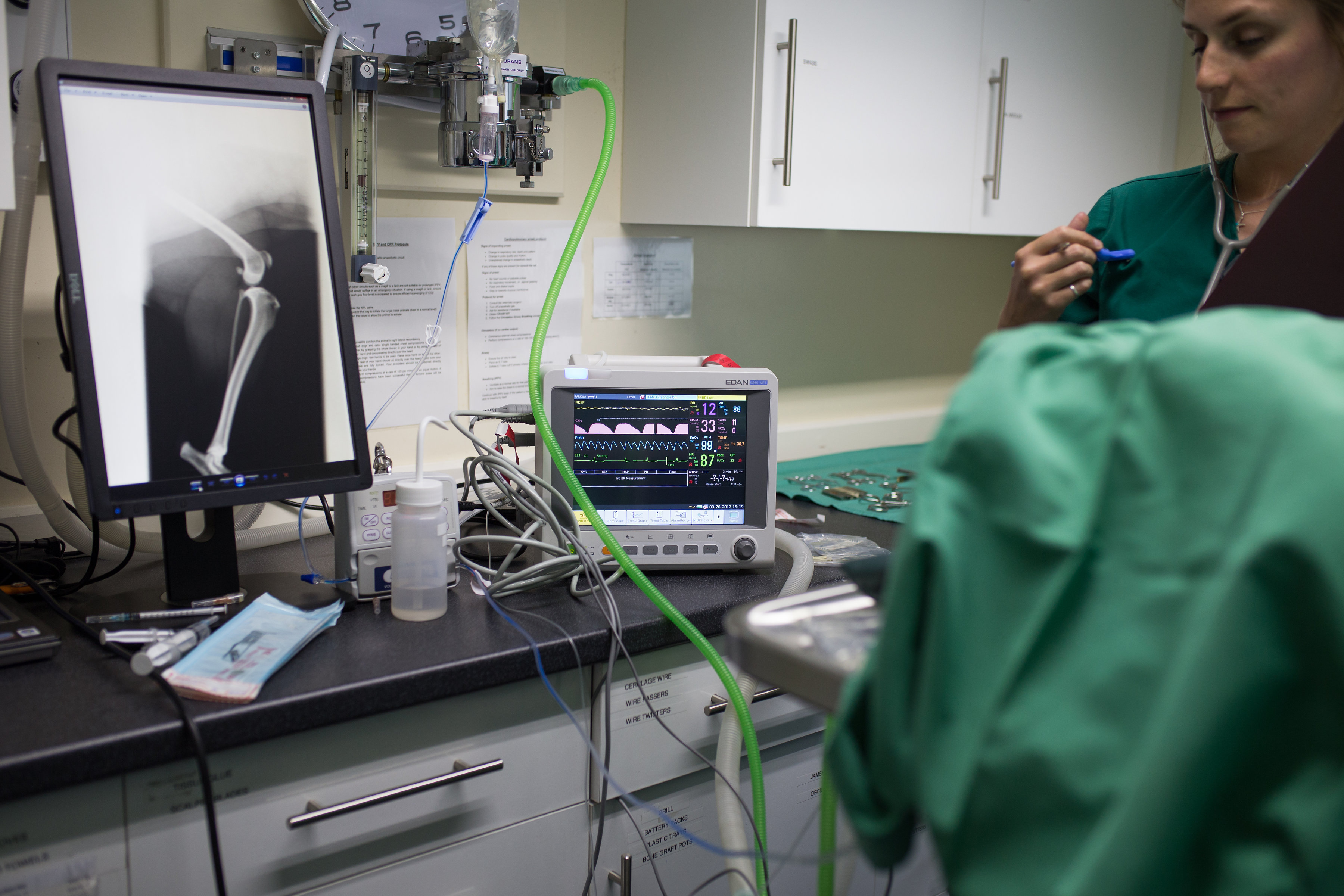 We have a range of equipment to keep your pet safe under anaesthetic. We routinely measure and record your pet's heart and respiratory rate, your pet's temperature and their blood pressure when under anaesthetic.
We have a range of equipment to keep your pet safe under anaesthetic. We routinely measure and record your pet's heart and respiratory rate, your pet's temperature and their blood pressure when under anaesthetic.
We also have equipment that measures the oxygen saturation of your pet's blood, their carbon dioxide percentage in expired air and their heart rhythm.
At our Parkway branch we have video endoscope that can be used for gastroscopy and colonoscopy. This can be used for taking biospies of dog's and cat's stomachs and colons. We also have a bronchosope for looking inside the lung and airways and a rigid rhinoscope for looking inside the noses of our patients!
Exotic vets Lance Jepson and Tom Bailey run an 'exotic pet' clinic at our Penllergaer and Neath branches one day per week.
As a practice we suggest that owners should consider insuring their animals. This means that financial constraints may have less of an influence on investigtions or treatment, if your animal were to become injured or unwell.
Veterinary treatment can be costly, and even a 24 hour stay at our Small Animal Hospital could easily leave you with a bill of over £300. In some cases, we do have to refer an animal to a more specialised referral practice that is better equipped to deal with particular illnesses and injuries. This can cost thousands of pounds, and some referral centres require payment in full before they will submit an insurance claim form.
Please find below a few frequently asked questions about insurance claims:
What is the difference between an indirect and a direct claim?
An indirect claim is where the balance is settled in full by yourself as the policy holder. You then bring a claim form into us, which is completed and submitted to your insurance company. After being processed and confirmed, your insurance company will settle the balance with yourself either by cheque or BACS.
A direct claim is used more frequently as it does not require the full bill to be settled by yourself. You will need to bring in a completed claim form to the practice, and pay your excess and any policy holder contributions before we submit your claim. The insurance company will then settle the balance with ourselves.
What are the most important things to look for when choosing an insurance company?
There are hundreds of different companies you could insure your pet with, however, they are all slightly different and will be offering different levels of cover.
It is important to check that your policy covers both illness and injury. Some policies will only cover injury, so if your animal were to develop a lifelong condition, you would have no cover in place.
Also, it’s important to check whether any conditions your pet may develop will be covered for the life of your pet. Some policies will only cover for 12 months, and others will have a maximum claimable amount, so it’s important to look at what cover you would actually be getting.
It is worth finding out whether exclusions will be placed on the policy if a claim is made, and also whether the policy premium or excess will increase if you make any claims.
Check what other benefits you will receive if you take out insurance with a particular company. Some policies will cover for extra expenses such as complimentary treatment (acupuncture, hydrotherapy, physiotherapy), boarding fees, advertising and rewards if your pet were to go missing, pet bereavement helpline, food claims and also phone helplines.
Are there any insurance companies you will not claim from?
No, we are happy to process claims for any insurance company. If you are able to drop a claim form into our surgery, or email a form over to us, we will be happy to process it.
Is there a fee if we ask you to process a direct claim?
The practice employs a full-time member of staff to process and deal with insurance queries and claims. We currently charge £16 to process a direct claim, this is per condition per policy year. Our insurance claims letter.
If you have any further questions or need help completing an insurance claim form, please contact any of our surgeries, and the receptionists will be more than happy to help. If you would like to discuss a current insurance claim that is being processed, please call 01792 643906.
In our main Parkway branch we have separate dog and cat isolation areas where we are able to hospitalise pets who have a suspected infectious condition. This isolation area has a separate entry and exit point to ensure these animals do not come into contact with any other animals, and are well away from the main cattery and kennels.
We have 2 large walk in kennels in the dog isolation area which allows large/giant breeds to be isolated if they are unwell. We also have 4 smaller kennels which can be opened up to create 2 larger kennels if needed. There are separate food preparation areas and bedding washing facilities to ensure there is no cross-contamination.
There are 5 cat kennels in our cat isolation area, and also a designated play room for any litters of unwell kittens that we may have in.
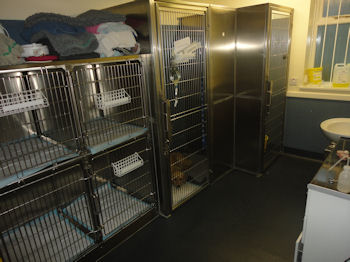
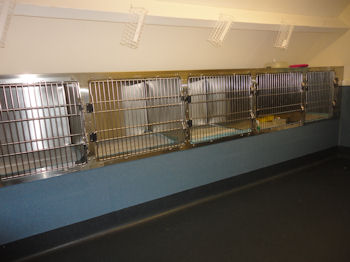
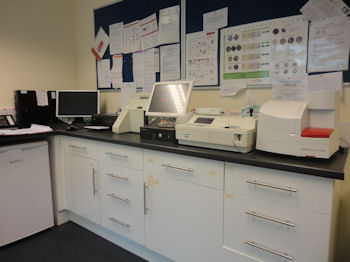 We are able to run many diagnostic tests in house to ensure fast results. We can offer a range of blood tests including pre-anaesthetic checks and diabetic monitoring. These are now available in all branches.
We are able to run many diagnostic tests in house to ensure fast results. We can offer a range of blood tests including pre-anaesthetic checks and diabetic monitoring. These are now available in all branches.
In our Parkway branch we are now able to run bloods to test thyroid, cortisol and bile acid levels that were previously sent off to an external laboratory. Results are often received within an hour of blood being taken.
This has accelerated the diagnosis and treatment of medical conditions as well as improving the speed at which we can monitor pets receiving treatment.
Our recommendations:
Spaying your bitch (female dog)
From 6 months old. We would normally spay your bitch three months after her last season. For situations where you cannot afford to let your bitch have her first season we would recommend neutering at six months (for more information or to speak to a vet or nurse feel free to contact us at any of our branches).
Castrating your dog
From 5 - 6 months
Spaying your cat
From 5-6 months. It is possible to spay your cat earlier (from 4 months) if you are concerned about the cat becoming pregnant.
Castrating your cat
From 4 months
Spaying rabbits, ferrets and guinea pigs
From 6 months
Castrating rabbits, ferrets and guinea pigs
From 6 months
All branches offer free advice regarding nutrition. We have a range of foods including life-stage and prescription diets available from brands such as "Specific" "Hills" "Royal Canin Waltham" and "Burns".
Alternatively if you can’t find the diet or the size of bag that you need on the shelf then we can order it for you within 24 hours.
You will also find a range of toys, treats, medicated shampoos and dental products in all our branches.
All our surgeries have a separate operating area and we have a number of anaesthetic monitoring devices to enhance safety.
If your pet requires an operation/general anaesthetic, please take note of the following:
Dogs and cats
Starve from food from 8pm the night before the procedure. They can have water up to the time they are admitted.
Ferrets
Starve from midnight.
Rabbits, guinea pigs, rats and mice
Do not starve.
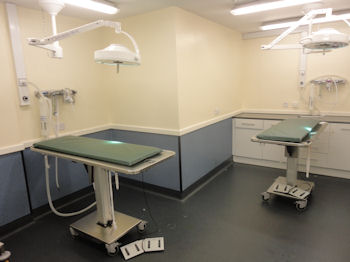
Some of our vets have Official Veterinarian (OV) qualifications which means that they can complete an Animal Health Certificate (AHC) to enable you to take your dog or cat abroad with you.
Please contact the branch you normally attend for further details.
Our recommendations:
As a practice we recommend an annual booster and check up.
Dogs
1st vaccination at 6- 8 weeks (DHP +L4) , 2nd vaccination at 10 weeks (DHP), 3rd vaccination four weeks after the first if having L4. (NB if using L2 this may be given at the 2nd vaccination at 10 weeks)
Dogs- Annual Boosters
The practice recommends an annual booster to “top up” immunity to Leptospirosis and Kennel Cough each year. A vaccination to “top up” immunity to Distemper, Hepatitis and Parvo virus should be given every 3 years.
Cats
1st vaccination at 9 weeks, 2nd vaccination at 12 weeks.
The vaccines that we use in cats protect against Feline Rhinotracheitis virus, Feline Calicivirus, Feline Leukaemia virus and Feline Panleucopaenia (Feline Parvo virus).
Rabbits
Rabbits can be vaccinated with a vaccine that covers Myxomatosis and VHD (Viral Haemorrhagic Disease VHD 1+2) annually.
All branches offer free, up-to-date professional advice regarding both flea and worming products and regimes by fully qualified staff that you may not get from supermarkets or other marketing outlets. For advice please phone the branch that you normally attend.

